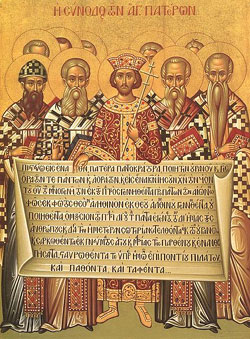Early Christianity
The Councils of the Early Church

The first church council was held in Jerusalem early in the history of the church (Acts 15). The apostle James apparently presided over this council . The church leaders were attempting to answer the question of how one became a Christian. Did one have to become a Jew first? The Jerusalem Council decided that gentiles could become Christians without having to go through the ritual of becoming Jewish first. Their reasoning and conclusions were recorded in the New Testament book the Acts of the Apostles
This has been the pattern of councils for most of church history.
- A question arises within the Church that is understood to be very important to the core understanding of what it means to be a Christian and differing opinions develop. This is not a question we can just agree to disagree about.
- The council meets to determine what the opinion of the Church should be
using
- Bible study,
- Prayer, and
- Reason
- a dogma or creedal statement is written.
The Roman Catholic Church recognizes twenty-one councils after the writing of the New Testament. Eastern Orthodox Churches recognize the first seven of these councils, and the Oriental Orthodox Churches recognize the first three of these councils. The Reformed Tradition values the work of councils and much of the theology developed in them. But we also believe that all councils may make mistakes. Creeds are not a replacement for Scripture or for the work of the Holy Spirit in your heart. But they are very important as statements of what thoughtful Christians believed, about a specific question, at that specific time. Below is a summary of the first seven church councils.
Nicaea, 325 |
Question: Was Jesus God, human, or both? |
| Constantinople, 381 | Question: Was the Holy Spirit a person or a power of God? Answer: The Holy Spirit is God. |
Ephesus, 431 |
Question: What is the nature of Jesus? |
Chalcedon, 451 |
Question: How can Jesus be both God and human? |
Constantinople, 553 |
Question: Was Jesus' nature divine or human? |
Constantinople, 680 |
Question: Which of Jesus' natures makes the decisions? |
Nicaea, 787 |
Question: What may be done with images of God, Jesus and saints? |